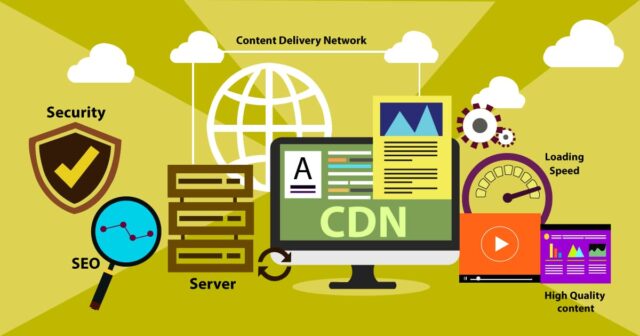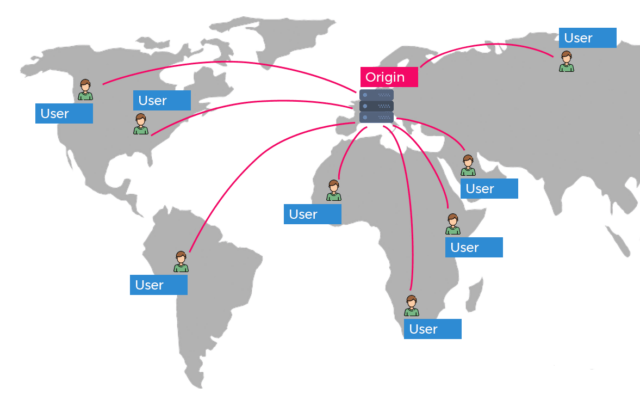
Are you having problems increasing the speed at which your website loads? Your website’s load time significantly impacts how well your business does. Visitors are greatly discouraged by slow websites since the entire user experience is ruined. You can, as a result, be losing visitors to your website.
The speed of your website is another critical factor for search engines. Website load time is a ranking element; Google declared it in its speed update last year. Therefore, having a slow website could hurt your rankings.
A content delivery network, or CDN, can assist in this situation. It accelerates the loading time of your website and gives users access to content right away.
Why is speed a factor for your website?

One of the most important characteristics of a website is its speed. Consequently, how may a website be made faster? Either way, it could increase website traffic or result in significant clientele loss.
In addition, conversions, sales, and other operations will be impacted by the website’s performance. So understanding website performance optimization is crucial. You’ll benefit from expanding your brand and attracting more customers if your site loads in under three seconds.
Furthermore, as website speed affects SEO, it’s critical to discover how to increase website speed. It will appear higher in search results if your website loads quickly.
What is a CDN?
A CDN is a global network of computer servers spread over numerous locations. The placement of a CDN enables them to distribute content more quickly to their intended location. For instance, if you are in the US, loading content from a US server will be quicker than loading it from a European server.
Images and videos on web pages are loaded by CDNs. Additionally, a properly built and secured CDN can aid in defending against online threats like DDOS attacks. CDNs cannot take the role of web hosting. They assist site hosts in caching content instead, allowing them to load files with less traffic. For additional information check Agilecdn.cloud.
Benefits of CDN for your Site

1. Enhanced Speed
The main advantage of employing a CDN for your webpage is unquestionably faster loading times, as we can see from the brief explanation of how a CDN operates. Using a server node that is located closest to the user making the request, a CDN distributes static material. Since the pace has increased, you can anticipate a marginally better user experience.
Since accessing and downloading static assets like images, scripts, and stylesheets takes up a large portion of the time it takes for a web page to load, it is clear why a CDN will significantly improve the efficiency of your webpage.
The use of a CDN won’t, however, instantly speed up the loading of your web pages. A CDN might not compensate for a website’s performance loss, for instance, if it includes incorrect coding. The capacity of your host and other factors, like server configuration, might affect how well your website performs. Implementing bandwidth monitoring can help you keep track of your website’s performance by measuring the amount of data transferred between your website and its visitors, in addition to considering host capacity and server configuration. Implementing a CDN (Content Delivery Network) is one of the essential tools to monitor the performance of websites. CDNs help distribute website content across multiple servers globally, improving loading times and reducing latency.
The main thing is that a CDN speeds up some of your site’s resources, increasing page load speed somewhat. For some users, this benefit alone makes a CDN worth the additional cost.
2. Improved Media Usage
No matter the business, being able to make your webpage stand out from the competition is something that will always be crucial. It offers up so many opportunities to be able to employ rich forms of material without being concerned about performance. It is well established that websites with rich media content—such as high-resolution photos, video, and unique assets—can occasionally tell stories more effectively.
Using interactive media platforms might help you build more client trust in the market. Even if a website loads quickly, no one appreciates a spartan or unprofessional-looking one.
3. No Geographical Limitations

We currently live in a mobile and Internet-driven world. Regardless of where they are in the world at any one time, users desire mobile access to services. A CDN is helpful in this situation. Users from all around the world can access your webpage as if they were physically present next to your host, thanks to the widely dispersed servers of a CDN.
Nevertheless, it’s essential to keep in mind that a provider’s coverage ultimately decides your reach. Check the coverage maps of different providers if you’re trying to reach users in a specific region to see where you might have the highest chance of success. Remember that CDN providers function differently depending on the location. Based on their network configuration, some have a definite edge in particular areas.
4. Increased Content Availability
Businesses are investing extensively in their web presence as they continue to reopen throughout COVID-19. Due to this shift in emphasis, handling high volumes of traffic on a site may result in system failures, which occasionally result in crashes or data loss.
In most circumstances, a CDN is superior to traditional hosting since it uses a distributed network of servers, which enables your website to handle more traffic and withstand some hardware faults.
5. Increased Security
Distribution Denial of Service attacks, or DDoS attacks, are among the ones that hackers currently carry out the most frequently. In most cases, it succeeds in shutting down a website or home server by massively overloading them with traffic.
A method of defense against it is more necessary because of how simple it is to conduct DDoS attacks on websites than because of how harmful they may be.
Whether owing to market swings or a DDoS attack, the entire architecture of CDN is designed to handle unfathomably large amounts of data and eliminate overwhelming load. Additionally, contemporary CDN providers have proactive defenses against assaults of this kind built right into them.

Conclusion
A CDN offers your website numerous performance advantages overall. A CDN may lessen the stress on your primary host by sharing bandwidth among several server nodes.
While this won’t automatically fix your server’s performance difficulties, it can significantly improve how easy it is for users to navigate your website.







